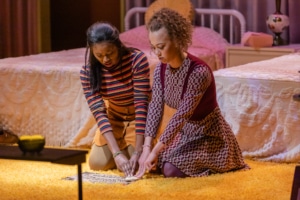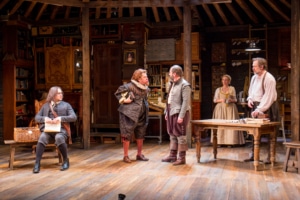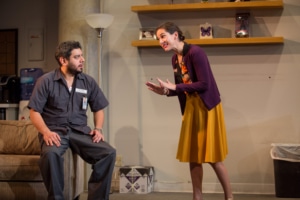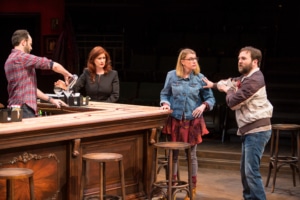DCPA NEWS CENTER
Enjoy the best stories and perspectives from the theatre world today.
Enjoy the best stories and perspectives from the theatre world today.
It’s been over 100 years since the 19th Amendment was ratified, effectively granting white women the right to vote and nearly 60 years since the Voting Rights Act expanded that right to women of color. And yet today, in 2022, women still struggle to have their voices heard. That’s why the Women’s Voices Fund (WVF) at the Denver Center for the Performing Arts (DCPA) is so impactful.

In the Upper Room by Beaufield Berry. Courtney A. Vinson and Kayla King. Photo by Adams VisCom.
What is the Women’s Voices Fund?
Established in May 2005 by then Artistic Director Kent Thompson, the WVF is an endowment fund created to foster the theatrical work of women playwrights – past, present, and future – to advance their plays and representation in the American theatre canon. According to Thompson, “The Denver Center wants to establish a major program that supports plays by and about women. We believe this kind of investment over time will both create opportunities for some of America’s most exciting artists and lead to the creation of the theatrical classics of tomorrow.”
Why is the WVF important?
In the 26 seasons before the WVF was created between 1980–2005, the DCPA Theatre Company had only produced 17 plays by women. In those 26 years, those 17 plays represented only 5% of the total plays produced.

The Book of Will by Lauren Gunderson. Rodney Lizcano, Triney Sandoval, Liam Craig, Jennifer Le Blanc, Kurt Rhoads. Photo Credit: Adams VisCom.
Thompson felt that the United States theatre contained a rich history of brilliant women writers, and he quickly changed this lack of representation in his second season as Artistic Director when he staged four plays by women in one year: Ladies of the Camellias by Lillian Groag, The Clean House by Sarah Ruhl, After Ashley by Gina Gionfriddo and Crowns by Regina Taylor. In the first four years of the Fund, the Theatre Company produced 15 plays by women, including six commissions, and hired more female directors.
This is not only a DCPA issue; it is endemic among theatres across the country. In a 2009 Princeton study, only 18% of the plays produced in non-profit subscription houses with more than 99 seats were written by women. Furthermore, the Dramatist Guild, the national trade association of playwrights, composers, lyricists, and librettists, helps produce an ongoing study called The Count, analyzing the percentage of plays produced off-Broadway and on nonprofit regional stages in the U.S. (In fact, this author was on the research team for the inaugural The Count in 2015). In the most recent 2021 installment, The Count 3.0, they discovered that only 31% of regional theatre productions were written by women.
“…it’s clear that, although the American theater has continued to add to the diversity of its playwrights, neither gender nor racial parity has yet been achieved in terms of production.” The Count 3.0
Since its inception, the WVF has enabled the DCPA Theatre Company to produce 38 plays by women. While not an equal representation between sexes, the percentage of produced plays written by women at the Theatre Company more than quadrupled to 26% in 15 years in large part because of the commitment of Women’s Voices Fund donors.
How is the WVF funded?

FADE by Tanya Saracho. Eddie Martinez and Mariana Fernández. Photo Credit: Adams VisCom.
When it was created, the endowment’s initial goal was $500,000. The plan was to find 100 donors who would each pledge $5,000 (payable over five years). Clearly the creation of the WVF struck a chord with funders as that $500,000 goal was exceeded in just six months. The Fund surpassed $1 million in value in 2014 and continues to grow.
In addition to the individual donors, the annual luncheon fundraiser, Women with Hattitude, was created to provide the WVF with more exposure and to generate additional funds. This luncheon is attended by individuals from across our Denver community donning extravagant hats and celebrating the artistry of women. Paused for two years in 2020 and 2021 due to COVID restrictions, this year’s Women with Hattitude is on Tuesday April 26, where everyone is will celebrate the work of this dynamic Fund.
What is the future of the WVF?
Combined with the endowment investments, plus proceeds from Women with Hattitude, today the Fund is valued at over $1.7 million.

The Nest by Theresa Rebeck. David Mason, Carly Street, Andrea Syglowski, Kevin Berntson. Photo Credit: Adams VisCom.
“When it was conceived, the Women’s Voices Fund was the first of its kind in the nation,” said current DCPA Theatre Company Artistic Director Chris Coleman. “Now it is the largest endowment to support the work of female playwrights and directors, serving as a model for other theatre companies across the country. Additionally, the new works being developed in Denver often go on to full productions around the country, thereby extending our impact throughout the nation.”
Moving forward, as the DCPA returns post-COVID, the WVF will be doubly important to not only help fund more productions by women, but also to reinforce the DCPA’s commitment to equity, diversity, and inclusion. Ultimately, the WVF is about finding and being able to produce the best work, and about developing the pipeline of new work by women playwrights available for production. With the national average of productions written by women increasing, and the DCPA’s own average going up, the data shows that, while slow, we hopefully won’t have to wait another 100 years for equal representation.
